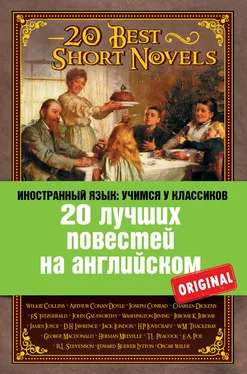‘Rowena my love, I come!’ he roared on his part. ‘Villains! touch but a hair of her head, and I …’
Here, with a sudden plunge and a squeal of agony, Bavieca sprang forward wildly, and fell as wildly on her back, rolling over and over upon the knight. All was dark before him; his brain reeled; it whizzed; something came crashing down on his forehead. St. Waltheof and all the saints of the Saxon calendar protect the knight! …
When he came to himself, Wamba and the lieutenant of his lances were leaning over him with a bottle of the hermit’s elixir. ‘We arrived here the day after the battle,’ said the fool; ‘marry, I have a knack of that.’
‘Your worship rode so deucedly quick, there was no keeping up with your worship,’ said the lieutenant.
‘The day – after – the bat—’ groaned Ivanhoe. ‘Where is the Lady Rowena?’
The castle has been taken and sacked,’ the lieutenant said, and pointed to what once was Rotherwood, but was now only a heap of smoking ruins. Not a tower was left, not a roof, not a floor, not a single human being! Everything was flame and ruin, smash and murther!
Of course Ivanhoe fell back fainting again among the ninety-seven men-at-arms whom he had slain; and it was not until Wamba had applied a second, and uncommonly strong dose of the elixir that he came to life again. The good knight was, however, from long practice, so accustomed to the severest wounds, that he bore them far more easily than common folk, and thus was enabled to reach York upon a litter, which his men constructed for him, with tolerable ease.
Rumor had as usual advanced before him; and he heard at the hotel where he stopped, what had been the issue of the affair at Rotherwood. A minute or two after his horse was stabbed, and Ivanhoe knocked down, the western bartizan was taken by the storming-party which invested it, and every soul slain, except Rowena and her boy; who were tied upon horses and carried away, under a secure guard, to one of the King’s castles – nobody knew whither: and Ivanhoe was recommended by the hotel-keeper (whose house he had used in former times) to reassume his wig and spectacles, and not call himself by his own name any more, lest some of the King’s people should lay hands on him. However, as he had killed everybody round, about him, there was but little danger of his discovery; and the Knight of the Spectacles, as he was called, went about York quite unmolested, and at liberty to attend to his own affairs.
We wish to be brief in narrating this part of the gallant hero’s existence; for his life was one of feeling rather than affection, and the description of mere sentiment is considered by many well-informed persons to be tedious. What were his sentiments now, it may be asked, under the peculiar position in which he found himself? He had done his duty by Rowena, certainly: no man could say otherwise. But as for being in love with her any more, after what had occurred, that was a different question. Well, come what would, he was determined still to continue doing his duty by her; – but as she was whisked away the deuce knew whither, how could he do anything? So he resigned himself to the fact that she was thus whisked away.
He, of course, sent emissaries about the country to endeavor to find out where Rowena was: but these came back without any sort of intelligence; and it was remarked, that he still remained in a perfect state of resignation. He remained in this condition for a year, or more; and it was said that he was becoming more cheerful, and he certainly was growing rather fat. The Knight of the Spectacles was voted an agreeable man in a grave way; and gave some very elegant, though quiet, parties, and was received in the best society of York.
It was just at assize-time, the lawyers and barristers had arrived, and the town was unusually gay; when, one morning, the attorney, whom we have mentioned as Sir Wilfrid’s man of business, and a most respectable man, called upon his gallant client at his lodgings, and said he had a communication of importance to make. Having to communicate with a client of rank, who was condemned to be hanged for forgery, Sir Roger de Backbite, the attorney said, he had been to visit that party in the condemned cell; and on the way through the Yard, and through the bars of another cell, had seen and recognized an old acquaintance of Sir Wilfrid of Ivanhoe – and the lawyer held him out, with a particular look, a note, written on a piece of whity-brown paper.
What were Ivanhoe’s sensations when he recognized the handwriting of Rowena! – he tremblingly dashed open the billet, and read as follows:
MY DEAREST IVANHOE, – For I am thine now as erst, and my first love was ever – ever dear to me. Have I been near thee dying for a whole year, and didst thou make no effort to rescue thy Rowena? Have ye given to others – I mention not their name nor their odious creed – the heart that ought to be mine? I send thee my forgiveness from my dying pallet of straw. – I forgive thee the insults I have received, the cold and hunger I have endured, the failing health of my boy, the bitterness of my prison, thy infatuation about that Jewess, winch made our married life miserable, and which caused thee, I am sure, to go abroad to look after her. I forgive thee all my wrongs, and fain would bid thee farewell. Mr. Smith hath gained over my gaoler – he will tell thee how I may see thee. Come and console my last hour by promising that thou wilt care for my boy – his boy who fell like a hero (when thou wert absent) combating by the side of ROWENA.’
The reader may consult his own feelings, and say whether Ivanhoe was likely to be pleased or not by this letter: however, he inquired of Mr. Smith, the solicitor, what was the plan which that gentleman had devised for the introduction to Lady Rowena, and was informed that he was to get a barrister’s gown and wig, when the gaoler would introduce him into the interior of the prison. These decorations, knowing several gentlemen of the Northern Circuit, Sir Wilfrid of Ivanhoe easily procured, and with feelings of no small trepidation, reached the cell, where, for the space of a year, poor Rowena had been immured.
If any person have a doubt of the correctness, of the historical exactness of this narrative, I refer him to the ‘Biographie Universelle’ (article Jean sans Terre [790]), which says, ‘ La femme d’un baron auquel on vint demander son fils, repondit, “ Le roi pense-t-il que je confierai mon fils a un homme qui a égorg é son neveu de sa propre main? ” Jean fit enlever la mére et l’enfant, et la laissa mourir de faim dans les cachots. ’ [791]
I picture to myself, with a painful sympathy, Rowena undergoing this disagreeable sentence. All her virtues, her resolution, her chaste energy and perseverance, shine with redoubled lustre, and, for the first time since the commencement of the history, I feel that I am partially reconciled to her. The weary year passes – she grows weaker and more languid, thinner and thinner! At length Ivanhoe, in the disguise of a barrister of the Northern Circuit, is introduced to her cell, and finds his lady in the last stage of exhaustion, on the straw of her dungeon, with her little boy in her arms. She has preserved his life at the expense of her own, giving him the whole of the pittance which her gaolers allowed her, and perishing herself of inanition.
There is a scene! I feel as if I had made it up, as it were, with this lady, and that we part in peace, in consequence of in providing her with so sublime a death-bed. Fancy Ivanhoe’s entrance – their recognition – the faint blush upon her worn features – the pathetic way in which she gives little Cedric in charge to him, and his promises of protection.
‘Wilfrid, my early loved,’ slowly gasped she, removing her gray hair from her furrowed temples, and gazing on her boy fondly, as he nestled on Ivanhoe’s knee– ‘promise me, by St. Waltheof of Templestowe – promise me one boon!’
Читать дальше
Конец ознакомительного отрывка
Купить книгу












